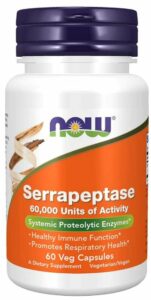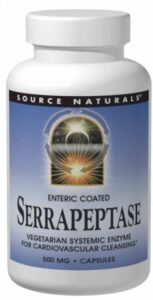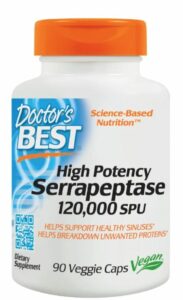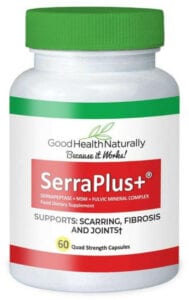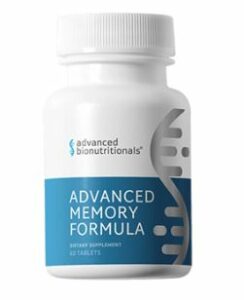The Ultimate Guide to Taking Proteolytic Enzyme Supplements
Proteolytic enzymes are a type of enzyme that breaks down proteins into smaller peptides and amino acids. They are produced naturally by the body and are also found in some foods, such as raw fruits and vegetables. Proteolytic enzyme supplements are dietary supplements that contain one or more types of proteolytic enzymes, and they are often taken to support digestion, reduce inflammation, and improve overall health and wellness.
There are several different types of proteolytic enzymes, including bromelain, papain, trypsin, and chymotrypsin. Each of these enzymes has its own specific function and potential health benefits. For example, bromelain is found in pineapples and is believed to have anti-inflammatory and pain-relieving effects, while papain is found in papayas and is believed to support digestion and reduce inflammation.
Proteolytic enzyme supplements are available in a variety of forms, including tablets, capsules, and powders, and can be purchased at health food stores, pharmacies, and online retailers. It is important to follow the dosage instructions on the product label and to speak with a healthcare provider before starting any new supplement to ensure that it is safe and appropriate for you.
It is important to note that the scientific evidence supporting the effectiveness of proteolytic enzyme supplements for various health purposes is limited, and more research is needed to fully understand their potential benefits and risks. Proteolytic enzyme supplements may interact with certain medications, including blood thinners and immunosuppressants, and it is important to discuss the use of any supplements with your healthcare provider to ensure that they do not interfere with any medications you may be taking.
Why is proteolytic enzyme supplement so important?
The proteolytic enzyme is necessary for many important tasks in our bodies, they are also known as proteases, proteins, or peptidases. Proteolytic enzymes are produced by the pancreas and the stomach, they are best known for protein digestion, but they also carry out many other important tasks as well.
What other tasks do proteolytic enzyme supplements do?
Apart from digesting protein, they are essential for blood clotting, cell division, protein recycling, and supporting immune function. Much the same as us humans’ plants depend on proteolytic enzymes to assist them with various jobs such as defending themselves against insects and helping plants to grow and develop.
What is interesting is that people who digest plant-based enzymes have reported several health benefits.
What is a proteolytic enzyme supplement?
Proteolytic enzymes are a certain type of enzyme that plays a major role in digesting protein as well as supporting the immune function and other vital processes, our bodies produce proteolytic enzymes, but they are also available in certain foods or proteolytic enzyme supplement forms.
Your digestive system naturally produces proteolytic enzymes the main ones are trypsin, pepsin, and chymotrypsin.
 What foods contain proteolytic enzyme supplements?
What foods contain proteolytic enzyme supplements?
These enzymes are also found in foods, two of the best examples are pineapple and papaya, pineapple contains a strong proteolytic enzyme called bromelain, the enzyme is inside the fruit, the skin of the fruit, and in the sweet pineapple juice.
The indigenous natives of South and Central America use it as a natural remedy for several health conditions. Papayas also contain a powerful proteolytic enzyme called papain, which breaks down protein it is found in the fruit, leaves, and root, and has been used for many years to tenderize meat.
Papain and Bromelain
We have established that both enzymes can be got by eating raw pineapple and papaya, however, they are also found in a concentrated supplement form. These two are the most common but there are other proteolytic enzyme supplements like Serrapeptase which comes from the silkworm, dietary proteolytic enzymes are also found in
- Ginger
- Kiwi fruit
- Kimchi
- Sauerkraut
- Yoghurt
- Kefir
- Asparagus
Proteolytic Enzymes Supplement
A Proteolytic enzyme supplement is sold in capsules, tablets, gel caps, chewable, and powder form, some are manufactured from a single proteolytic enzyme other have a combination of enzymes.
Enzyme manufacturers use proteolytic enzymes from two sources, animal and plant, a good example is some of the most popular proteolytic enzymes trypsin and chymotrypsin are found in cows and pigs.
While fruit-based enzymes like papain and bromelain are found in papaya and pineapple.
Potency
If you are buying a proteolytic enzymes supplement check for the ingredients on the label, you need to know the potency of the supplement some manufacturers don’t put this information on the label. IU is the standard measurement for a proteolytic enzyme supplement, it stands for international units or units of activity, and it can be difficult to know exactly which potency or strength to purchase.
I recommend that you contact the manufacturer tell them what your health condition is and ask them for advice on the dosage. You will find different labeling on proteolytic enzyme supplements including HUT, USP, or SAP.
It can be confusing, I recommend that you look only at proteolytic enzyme supplement brands that show the IU or units of activity, that is the only way to be sure that they are equal.
What are the health benefits of proteolytic enzymes?
Proteolytic enzymes are very popular anecdotal evidence would suggest a range of health benefits;
1. May help with digestion
A lot of people suffer from digestive issues, proteolytic enzymes are commonly used to help with the absorption of dietary protein, for example, PERT (pancreatic enzyme replacement therapy) is routinely used to treat pancreatic insufficiency, cystic fibrosis, types of cancer like pancreatic, stomach and colorectal, PERT is also used after gastric and pancreatic surgery.
People with a deficiency in their ability to break down and digest protein can benefit from taking proteolytic enzymes from food and supplements. Kiwi fruit extract has been shown in studies to help in breaking down and digesting proteins, especially milk, cheese, meat, and eggs.
A further study showed that a group of people with indigestion reported significant improvements in abdominal pain, bloating, heartburn, loss of appetite, and belching.
2. May reduce inflammation
Inflammation is a response by our bodies to infection, proteolytic enzymes have proved in several studies to be effective at inflammation reduction and related symptoms.
A ten studies review of the proteolytic enzyme bromelain found that people with osteoarthritis got relief from the symptoms of pain, joint stiffness, and swelling. A further study of rats who were given a combination of proteolytic enzyme trypsin, chymotrypsin, and Serrati peptidase found that inflammation was reduced by a greater amount than that of aspirin.
People with sinusitis typically suffer from inflammation in the nasal passages, bromelain is particularly effective at relieving these symptoms.
3. Can promote healing and recovery
Proteolytic enzymes supplement can digest dead cells and are effective for healing wounds, during animal studies papain and bromelain were used to speed up tissue growth by applying them straight onto the skin. Recovery times were also shortened following surgery using the same method.
A study of 24 participants following dental surgery demonstrated by taking a 5-milligram dose of Serrapeptase swelling and pain were reduced significantly.
4. Good for sore muscles
For people who do strenuous workouts or sports people muscle soreness is an issue, one Male study found that when a proteolytic enzyme supplement consisting of Curcumin and bromelain was given there was a significant improvement in muscle soreness and pain when compared to the placebo.
A further study of people who did hill running found that a supplement containing bromelain, trypsin, and papain reduced the pain of sore muscles and aided recovery times.
5. May help with IBS
Inflammatory Bowel disease produces symptoms such as bloating, constipation, gas, abdominal pain, and swelling, proteolytic enzymes have been found to reduce these symptoms in several studies.
For example, during a study of 126 people with irritable bowel syndrome (IBS) a papain supplement was given with big improvements in symptoms of bowel movements, constipation, and bloating. A study where 90 people with IBS were involved reported that by giving a proteolytic enzyme supplement symptoms of gas, bloating and abdominal pain were reduced.
Bromelain has additionally been shown to reduce symptoms of Crohn’s disease and ulcerative colitis.
6. May reduce bursitis symptoms
Bursitis is caused by inflammation of the small bursa, which are tiny sacs of fluid surrounding the joints, typically inflammation occurs around the hip or elbow areas causing swelling and pain.
Serrapeptase is a proteolytic enzyme that acts to reduce swelling and pain associated with bursitis symptoms.
7. May help with carpal tunnel syndrome
Carpal tunnel syndrome is quite a common condition caused by pressure on the median nerve in the carpal tunnel area of the hand, symptoms include tingling, numbness, and weakness in that area. There are many reasons why it occurs, one reason could be inflammation, and this is where a proteolytic enzyme like Serrapeptase can help.
Serrapeptase was used in a 6-week trial for patients with carpal tunnel syndrome, at the end of the trial more than two-thirds of the participants both Male and female reported significant improvements in their symptoms.
How to get the best out of proteolytic enzymes
Depending on what you want to achieve proteolytic enzymes can be used in several ways, if you just want to get more of them in your food then eat more pineapple, papaya, and kiwi fruit.
If you have any of the health conditions listed above or you want to have faster recovery from muscle soreness then I suggest that you buy avoid quality proteolytic enzymes supplement from a reputable manufacturer where you can see on the label the dosage in IU.
Don’t just go for the cheapest brand take time to compare what you are getting for the money.
Over on Good health naturally, you will find nearly every conceivable proteolytic enzyme brand including dosage, instructions, and verified testimonials, Good health naturally can deliver to any part of the world. If you are taking medication, please consult your doctor or naturopath before starting on proteolytic enzymes.
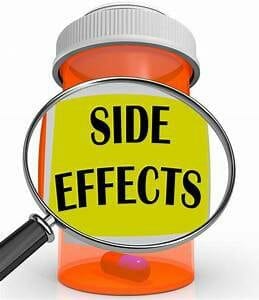
Side effects
Are there side effects?
In general, proteolytic enzymes are thought to be safe to take, however, everybody has a different metabolism meaning we don’t all react in the same way to something new being introduced into our bodies.
Some noted side effects that may or may not happen to you include:
- Diarrhoea
- Nausea
- Vomiting
- Allergic reaction
- Skin rash
Just be careful and stick to the recommended dosage, always fake with a glass of water on an empty stomach, please note that consuming big amounts of fruit that contain proteolytic enzymes can cause stomach upset.
Please be aware that bromelain and papain in supplement form can interfere with blood thinners like warfarin or aspirin. Consult with your doctor before taking it.
Summary:
To get the beneficial effects of proteolytic enzymes eat more of the foods that we know to be rich in them or go for a good quality proteolytic enzyme supplement, some may cause side effects or react to certain medications.
Conclusion:
Studies have demonstrated that proteolytic enzymes are important for many bodily functions, one is the ability to break food down to give us energy, we know that proteolytic enzymes are found in certain foods and are also available in supplement form.
We know also that these enzymes are good for digestion, decreasing inflammation, easing arthritis pain as well as reducing symptoms associated with IBS. We also know that eating foods that contain these enzymes or taking a proteolytic enzyme supplement can benefit your health in many ways.
Systemic enzymes
These enzymes are present in supplements and work on cells, cell tissues, and organs in our bodies, they don’t just work on digestive enzymes, if you have been searching for systemic enzymes on the net you may have seen that these letters are written after the enzyme name IU, SPU, SU, or FU.
If you are confused, I completely understand, manufacturers can use a different measurements for the same enzyme, so let me explain what all that means:
As a consumer, your number one concern should be how potent is the enzyme or how well will it work for you, potency is how you know how active the proteolytic enzyme supplement is going to be and how long it will take to work. A good example is Serrapeptase where you have differing IU levels, so 80,000 IU, 120,000 IU, 250,000 IU, obviously the strongest dose 250,000 is more potent and will work faster.
Remember IU means units of activity, so the more units the greater the activity. SPU or SU means Serrapeptase units, different manufacturers will interchange the measurement to describe its potency. The higher the number of SPUs the more potent that product is.
FU means Fibrinolytic units; you may see this measurement in a natural arterial plaque reducer Nattokinase a standard measurement for Nattokinase would be 2,000 FU per capsule.
IU or international units are used generally to explain the potency or blend of different enzymes or a combination of proteolytic enzymes.
Should you buy enteric-coated proteolytic supplements?
A proteolytic enzyme supplement comes in two forms enteric-coated and non-enteric-coated, the enteric-coated formula was created so that the effects of the proteolytic enzyme would not be diminished by stomach acid or a highly acidic ph. Supporters of this theory will argue that coating the supplement means that it will get through the acid unscathed where it is then absorbed by the intestine.
Opponents of enteric-coated enzymes will argue that a proteolytic enzyme supplement is derived mostly from plants and can live at a higher ph. environment compared to an animal-based enzyme. Systemic enzymes ideally taken on an empty stomach should have less exposure to stomach acid.
 Proteolytic enzymes supplement dosage
Proteolytic enzymes supplement dosage
Which is the correct dosage for you? A lot depends on what health condition you are trying to get help for, the dosage will vary subject to the known symptoms acute or chronic. If you have mild symptoms it stands to reason that you may only need the lower dosage however if your symptoms are chronic then you would be best advised to go for the strongest dose.
Footnote;
If you are considering taking enzyme therapy please consult with a naturopath, someone who has experience in this field, your doctor may have had no training in nutrition and not be knowledgeable about proteolytic enzymes supplement.
REFERENCES
- https://en.wikipedia.org/wiki/Enzyme_unit
- http://doctorvolpe.com/chronic-fatigue/systemic-enzymes/
- http://www.serrapeptase.org/serrapeptase-research/enzyme-activity-spu-su-iu/
- http://www.springboard4health.com/notebook/health_nattokinase.html
- https://www.ncbi.nlm.nih.gov/pmc/articles/PMC4030975/
- https://www.jci.org/articles/view/102636
- http://www.jbc.org/content/116/2/477.full.pdf
Related Articles:
What’s the best digestive enzyme supplement?
The ultimate guide to liver detox with advanced liver support
Search
Categories
- Adrenal fatigue
- Aging
- Beauty Products
- Beauty Products
- Bladder Health
- Blocked fallopian tubes
- Blood Flow
- Bones
- Calcification of the arteries
- Carpal Tunnel Syndrome
- Cholesterol
- Circulation
- CLE Holistic
- Copd Emphysema
- Diabetes
- Endometriosis natural treatment
- Erectile dysfunction
- Eye health
- FAQ
- Female health
- Gout
- Gut Health
- Hair loss
- Heart disease
- Heartburn
- High Blood Pressure
- Hip Bursitis
- Hip leg pain
- Ice Barrel
- Immune system
- Indigestion
- Inflammatory Diseases
- Liver Function
- Medical questions answered by a Doctor
- Memory
- Mental health
- Migraines
- Mitochondrial
- Muscle loss in old age
- Nerve Vitamins
- Numbness tingling
- Peyronies disease
- Posts
- Premature ejaculation
- Probiotics
- Prostate
- Scar Tissue
- Sexual Health
- Sinus Infection
- Sleep disorders
- Stress
- Supplements reviews
- TESTIMONIALS
- Testosterone
- Trace minerals
- Vitamins
- Weight loss supplements
Newsletter
Sign up and stay informed
Synergy Hearth & Health
Thank you!
You have successfully joined our subscriber list.


